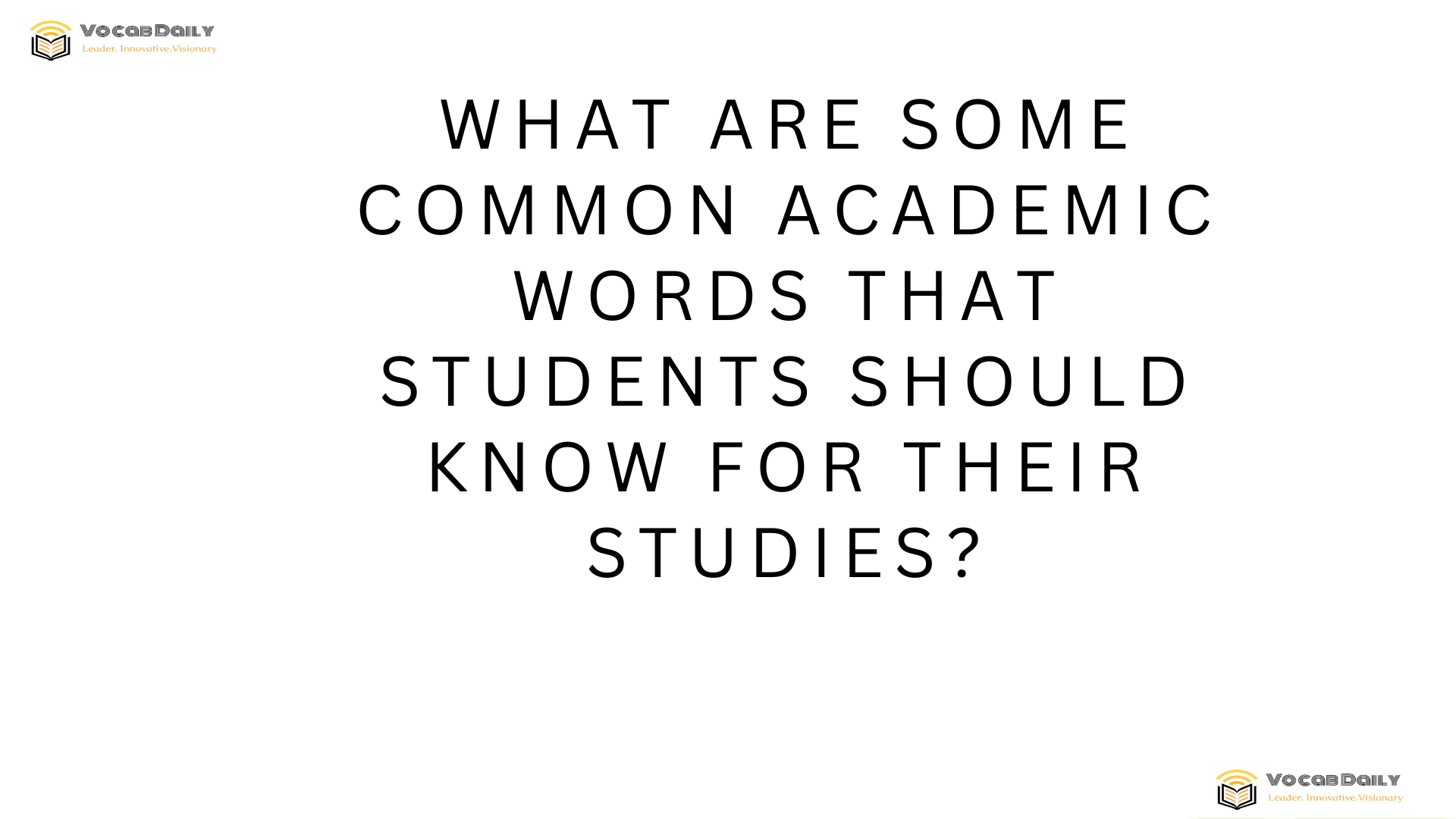Essential Academic Vocabulary for Students
Academic success often depends on understanding and effectively using a specific set of vocabulary words that are common across various fields of study. These words help students comprehend textbooks, write essays, participate in discussions, and perform well on exams. Familiarity with academic vocabulary enhances critical thinking and communication skills, which are invaluable throughout a student’s educational journey.
Common Academic Words Related to Analysis
Analysis is a critical skill in academics that involves breaking down complex information into smaller parts to understand it better. Some important words related to analysis include:
- Analyze – To examine something methodically and in detail.
- Interpret – To explain or understand the meaning of information.
- Evaluate – To assess or judge the value or quality of something.
- Compare – To identify similarities and differences between two or more items.
- Contrast – To highlight differences between two or more things.
Mastering these words helps students when reading academic texts and in writing analytical essays or reports.
Vocabulary for Argumentation and Persuasion
Students often need to present clear arguments or persuade an audience, whether in writing or speaking. Key words for this include:
- Claim – A statement or assertion that something is true.
- Evidence – Facts, examples, or information supporting a claim.
- Reasoning – The process of thinking about something logically to form conclusions.
- Justify – To show or prove why an argument or action is right.
- Counterargument – A contrasting or opposing argument to someone else’s point.
Understanding these terms helps students create stronger essays and participate in debates effectively.
Words That Help Describe Research and Study Methods
Research is an essential part of academic work. Here are common terms associated with research processes:
- Methodology – The system of methods used in a particular study or area of research.
- Data – Information collected for analysis.
- Survey – A method of gathering information by asking questions to a group of people.
- Experiment – A scientific procedure to test a hypothesis.
- Hypothesis – A proposed explanation made on the basis of limited evidence as a starting point for further investigation.
Knowing these terms helps students understand academic papers and design their own research projects.
Academic Words Used in Writing and Composition
Clear and organized writing is a necessity in education. Below are words commonly linked to writing:
- Thesis – The main idea or argument of an essay or research paper.
- Outline – A plan or summary of the main points of a piece of writing.
- Paragraph – A distinct section of writing focused on a single idea.
- Transition – Words or phrases that connect ideas smoothly between sentences or paragraphs.
- Conclusion – The final part of a piece of writing summarizing the main points or presenting a final thought.
Being familiar with these words can help students structure their essays clearly and effectively.
Key Vocabulary for Critical Thinking
Critical thinking is essential for evaluating information and ideas responsibly. Important terms that build critical thinking skills include:
- Assumption – Something accepted as true without proof.
- Bias – A prejudice or preference that influences one’s perspective.
- Validity – The quality of being logically sound or well-founded.
- Inference – A conclusion reached based on evidence and reasoning.
- Implication – A possible effect or result of an action or decision.
Learning these words allows students to question information critically and to avoid common thinking errors.
General Academic Terms Used Across Subjects
Certain words appear frequently no matter the subject and are essential to students’ academic vocabulary. Some examples are:
- Concept – An abstract idea or general notion.
- Theory – A system of ideas intended to explain something based on evidence.
- Factor – A circumstance or influence contributing to a result.
- Variable – An element, feature, or quantity that can vary or change.
- Significance – The importance or meaning of something.
These words help students describe ideas clearly and understand academic discussions.
Tips for Learning and Remembering Academic Vocabulary
Building a strong academic vocabulary takes time and consistent effort. Here are some effective tips to help students learn these words:
- Read regularly: Engage with academic articles, textbooks, and credible online resources to see these words used in context.
- Use flashcards: Writing down words and their meanings can help with memorization and review.
- Practice writing: Incorporate new vocabulary into essays and assignments to reinforce learning.
- Engage in discussions: Speaking with classmates or teachers helps solidify understanding and pronunciation.
- Use vocabulary apps: Many educational apps are designed to build academic vocabulary systematically.
Applying these strategies ensures that students not only learn new words but also use them confidently.
Why a Strong Academic Vocabulary Matters
Having a well-developed academic vocabulary benefits students in numerous ways. It improves reading comprehension, allowing students to grasp complex texts more easily. It enhances writing skills by providing precise language to express ideas clearly. Additionally, it boosts listening and speaking abilities, which are crucial in presentations, discussions, and collaborative projects.
Moreover, academic vocabulary lays the foundation for critical thinking, enabling students to analyze, evaluate, and synthesize information effectively. Ultimately, these skills contribute to academic achievement and prepare students for future educational and professional opportunities.
Also check out VocabDaily workbook collections.

Leave a Reply